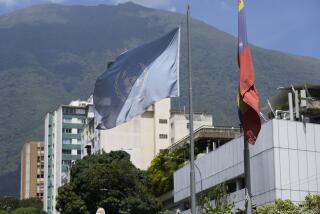Prosecution Barred in U.N. Official’s Death : Chile: Military intelligence agents will not be tried in murder of Spaniard. Family’s lawyer plans an appeal, but court is unlikely to act further.
- Share via
SANTIAGO, Chile — A Supreme Court justice has ruled against the prosecution of military intelligence agents for the abduction and murder of Carmen Soria, a U.N. official and Spanish citizen killed here in 1976.
The Thursday ruling confirmed an earlier decision by a military court to close the Soria case, a notorious emblem of unredressed human rights violations under Chile’s former dictatorship.
Gen. Augusto Pinochet, who headed that military government, turned over power to an elected civilian government in 1990 but remains commander of the army.
Many laws decreed during the dictatorship remain in force, and hundreds of cases of human rights violations under the regime have yet to be resolved by the courts.
Without naming agents responsible for Soria’s death, a military judge ruled in early December that they were eligible for amnesty under a 1978 decree. Soria’s family appealed that decision to the civilian Supreme Court.
After Madrid called its ambassador in Santiago back to Spain for consultations, the Supreme Court appointed one of its members, Marcos Libedinsky, to investigate the military court’s decision. Libedinsky announced Thursday that he had found no legal grounds for reopening the Soria case.
Both the family and civilian government officials have argued that the amnesty law does not apply in cases that affect the country’s relations with foreign governments.
EFE, the Spanish news agency, said that a spokesman for Spain’s Foreign Ministry expressed “deep disappointment” over Libedinsky’s decision.
Alfonso Insunza, a Chilean lawyer representing Soria’s family, said he will appeal the decision to the full Supreme Court. Insunza said the amnesty is unconstitutional in this case because Chile has ratified an international treaty that requires it to prosecute cases of homicide against international officials.
The conservative Supreme Court has rarely ruled against military officers in human rights cases. It was the Supreme Court that transferred the Soria case from civilian to military jurisdiction in November.
“Libedinsky virtually brings an end to a case that caused recent diplomatic tension with the Spanish government,” said a front-page report Friday in the Santiago newspaper El Mercurio.
Libedinsky’s decision, published Friday, cites evidence that Soria was detained by a group of military men working for the Directorate of National Intelligence, the political police agency formed after Chile’s 1973 military coup. The agency, known as DINA, has been charged with hunting down and killing hundreds of leftists.
Soria was taken to the Santiago home of Michael Townley, an American expatriate who worked for DINA.
There, “he was subjected to interrogation, physical force and, finally, was killed,” Libedinsky wrote in his decision.
Soria’s body, with a broken neck, was found later in an irrigation canal.
Soria, who fled Francisco Franco’s regime in Spain, had both Spanish and Chilean citizenship. In 1976 he headed the editorial department of the Latin American Demographic Center, part of the Santiago-based U.N. Economic Commission for Latin America and the Caribbean.
Chilean newspapers have reported that DINA was investigating him for helping Communists escape secretly from Chile to avoid persecution by the military regime.
More to Read
Sign up for Essential California
The most important California stories and recommendations in your inbox every morning.
You may occasionally receive promotional content from the Los Angeles Times.













